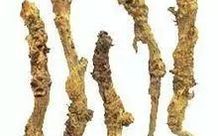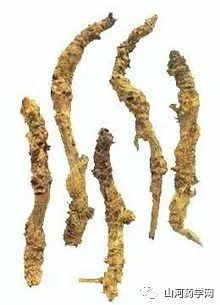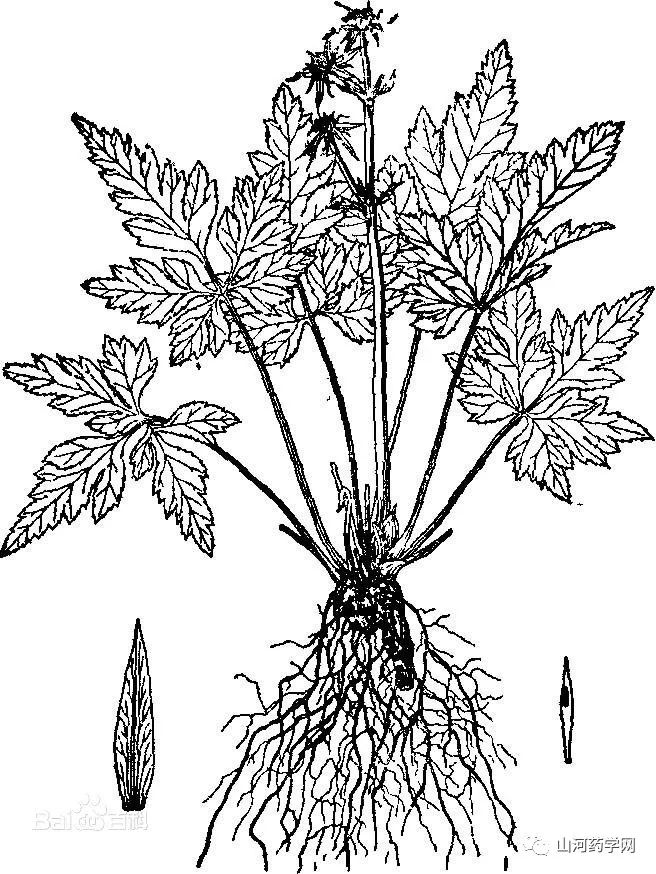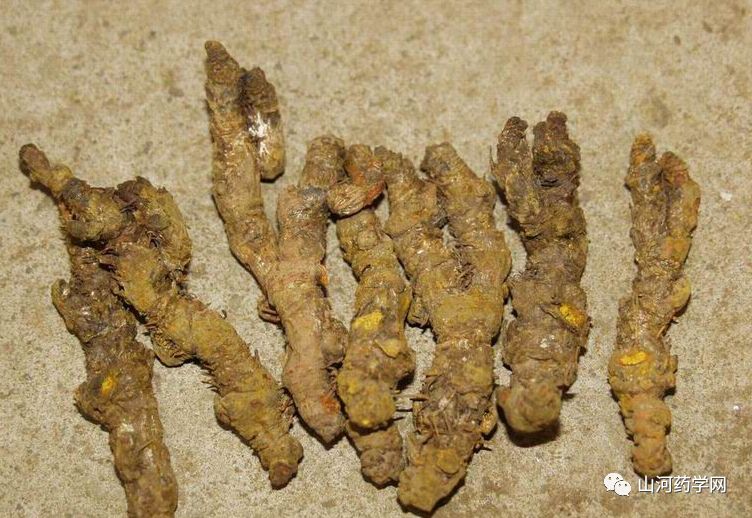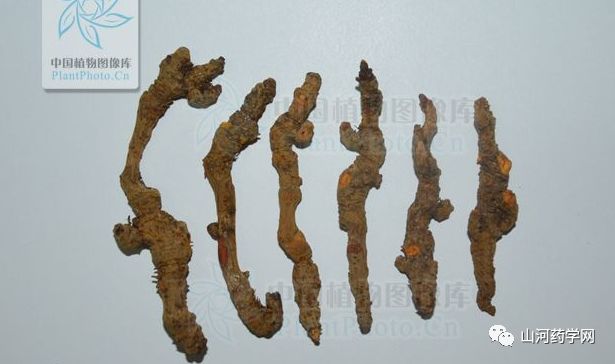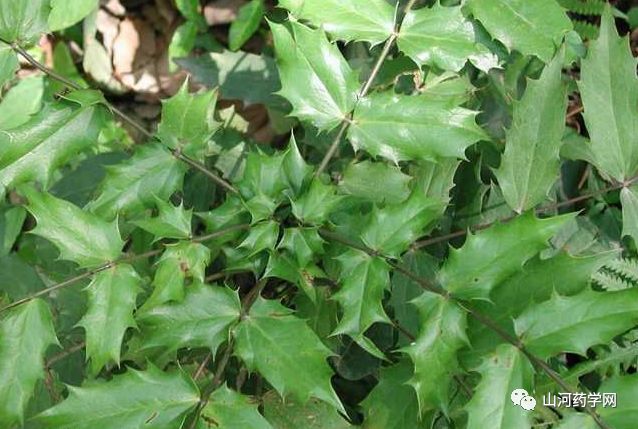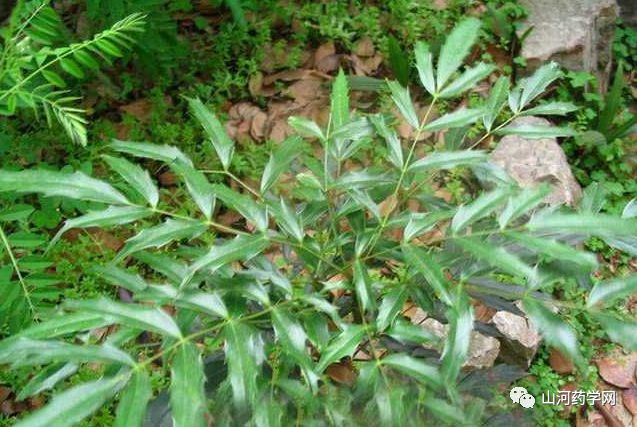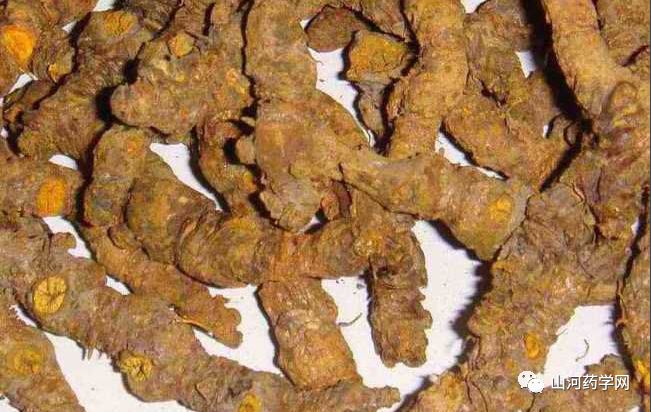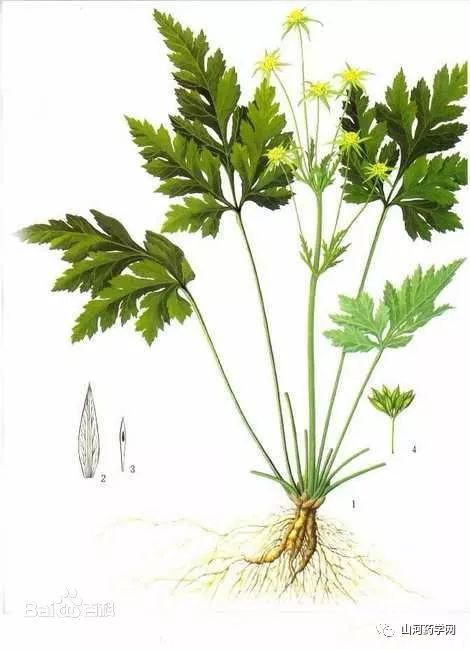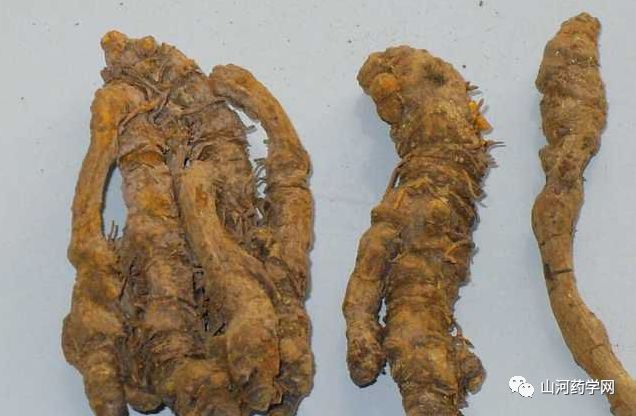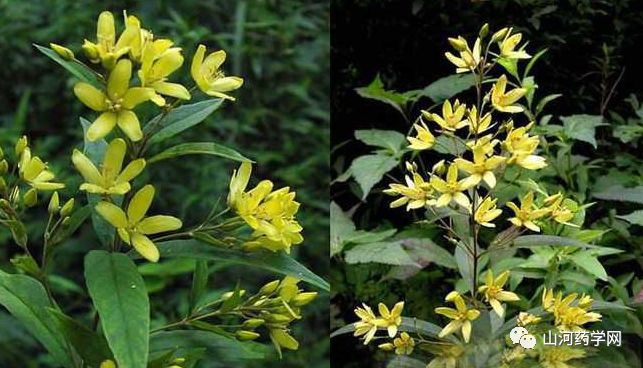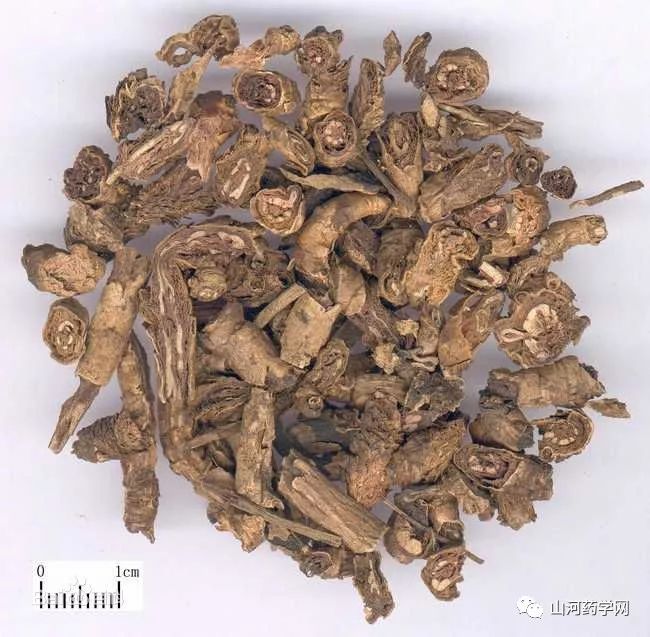| Huang Lian Huánɡ Lián | |
|---|---|
|
|
|
| Alias | Yun Lian, Ya Lian, Chuan Lian, Wei Lian, Ji Zhua Lian, Wang Lian, Zai Lian, Zhi Lian |
| Functions | Clears heat, dries dampness, detoxifies, kills parasites. Used for seasonal heat toxins, febrile diseases, excessive heat causing irritability, fullness and nausea, bacterial dysentery, heat diarrhea with abdominal pain, lung abscess, vomiting, epistaxis, hematochezia, diabetes, malnutrition, ascariasis, whooping cough, sore throat, fiery eyes, oral ulcers, carbuncles, eczema, and burns. |
| First Recorded In | Shennong Bencao Jing |
| Toxicity | Non-toxic |
| Meridians Entered | Stomach, Heart, Liver, Large Intestine |
| Nature | Cold |
| Taste | Bitter |
Basic Information
【Alias】Huang Lian, Chuan Lian, Jiang Lian, Chuan Huang Lian, Jiang Huang Lian, Jiang Chuan Lian, Jiang Zhi Huang Lian, Yu Lian, Yu Huang Lian, Chao Huang Lian, Wu Yu Huang Lian, Jiu Lian, Jiu Huang Lian, Jiu Yin Lian, Zhu Dan Zhi Chao Huang Lian, Yan Chao Huang Lian, Huang Lian Tan, Jiang Zhi Chao Chuan Lian, Wei Lian, etc. 【Source】This product is the dried rhizome of the plant Coptis chinensis or Coptis teeta Wall. 【Original Plant】1. Huang Lian: A perennial herb with branched rhizomes resembling chicken feet. The leaves are basal with long petioles; the leaf blades are ovate-triangular, trifoliate, with the central lobe being rhomboid and deeply lobed, with serrated edges. Flower stalks 1-2, terminal, with 3-8 flowers in a compound umbel. 2. Yun Lian: The central lobes of the leaves are ovate-rhomboid or long-rhomboid, deeply lobed with 3-6 pairs of lobes. 【Properties】Bitter, cold. Enters the Heart, Spleen, Stomach, Liver, Gallbladder, and Large Intestine. 【Functions and Indications】Clears heat and dries dampness, detoxifies. Used for damp-heat fullness, vomiting, acid regurgitation, diarrhea, jaundice, high fever with delirium, excessive heart fire, irritability and insomnia, blood heat with vomiting and epistaxis, red eyes, toothache, diabetes, carbuncles; externally used for eczema, damp sores, and purulent ear discharge. Jiu Huang Lian is good for clearing heat from the upper jiao. Used for red eyes and oral ulcers. Jiang Huang Lian harmonizes the stomach and stops vomiting. Used for cold-heat counterflow, damp-heat obstruction, fullness, and vomiting. Yu Huang Lian soothes the liver and harmonizes the stomach to stop vomiting. Used for liver-stomach disharmony and acid regurgitation. 【Applications】1. Used for damp-heat accumulation, gastrointestinal damp-heat, vomiting, diarrhea, etc. Combined with Huang Qin (Scutellaria baicalensis), Da Huang (Rheum palmatum), it can treat damp-heat accumulation. For damp-heat lingering in the gastrointestinal tract, often combined with Ban Xia (Pinellia ternata), Zhu Ru (Bamboo shavings); combined with Mu Xiang (Aucklandia lappa), Huang Qin, Ge Gen (Pueraria lobata) to treat diarrhea. 2. Used for warm diseases with high fever, thirst, irritability, blood heat with reckless movement, and heat toxin sores. Treats warm disease with high fever, excessive heart fire, combined with Zhi Zi (Gardenia jasminoides), Lian Qiao (Forsythia suspensa); for blood heat with reckless movement, can combine with Huang Qin, Da Huang; for heat toxin sores, can combine with Chi Shao (Paeonia lactiflora), Mu Dan Pi (Paeonia suffruticosa). Additionally, Huang Lian can be used for stomach fire with digestive issues, combined with Tian Hua Fen (Trichosanthes kirilowii), Zhi Mu (Anemarrhena asphodeloides), Sheng Di (Rehmannia glutinosa); for oral ulcers, it can be applied topically. 【Dosage and Administration】 Decoction, 2-5g. For external use, apply as needed. 【Precautions】 This product is very bitter and cold; excessive or prolonged use can harm the Spleen and Stomach. It is contraindicated for those with Spleen and Stomach deficiency-cold. Bitter and drying can injure fluids; use cautiously for those with Yin deficiency and fluid injury. Indications 1. Heart fire excess. Use Huang Lian Qiyi, add 1.5 bowls of water, decoct to 1 bowl, take warm after meals (with food). Reduce dosage for children. 2. Summer heat fever, thirst, vomiting, and dysentery. Use 1 jin of Huang Lian, cut small, add 2.5 sheng of good wine, boil until dry, then roast and grind into balls the size of a wutong seed. Take 50 balls each time, three times a day. This formula is called “Huang Long Wan”. 3. Bone heat and yellowing. Use 4 fen of Huang Lian, cut small, add 5 large cups of children’s urine, soak overnight, simmer for 3-4 boils, remove dregs, take in two doses. 4. Children’s malnutrition heat (skin sores, tidal fever, abdominal distension, thirst). Use 5 liang of Huang Lian, cut into pieces, moisten with water, place in a pig’s stomach, sew it up, steam with rice until cooked, mash with a little rice into balls the size of mung beans. Take 20 balls each time, with rice soup. Additionally, take blood-regulating heart medications for faster recovery. 5. Diabetes with frequent urination. Use Huang Lian powder mixed with honey to form balls the size of a wutong seed, take 30 balls each time. Another formula: 0.5 jin of Huang Lian, 1 sheng of wine, place in boiling water for a while, dry, grind into balls the size of a wutong seed. Take 50 balls with warm water. 6. Urine like oil (note: this is a late-stage diabetes condition). Use 5 liang of Huang Lian, 5 liang of Gua Lou (Trichosanthes fruit), grind into powder, mix with Sheng Di juice to form balls the size of a wutong seed. Take 50 balls with milk, twice a day. Avoid cold water and pork. 7. Tetanus. Use 5 qian of Huang Lian, add a bowl of wine, decoct until 70% done, then add 3 qian of yellow wax, dissolve, and take warm. 8. Leucorrhea. Use equal parts Huang Lian and Bai Fu Ling (Poria cocos) powder, mix with wine to form balls the size of a wutong seed. Take 30 balls with a decoction of Bu Guo Zhi (Psoralea corylifolia). Take three times a day. 9. Dysentery with blood. Use 1 liang of Huang Lian, add 2 sheng of water, boil down to half a jin, expose overnight, take warm on an empty stomach the next day. Another formula: 1 liang of Huang Lian, mix with egg white to make a cake, burn until purple, grind finely, and use 3 sheng of water to slowly boil into a paste. Take half a cup with warm rice soup. You can also make balls with just egg white and Huang Lian powder. Another formula: 2 liang of Huang Lian, cut into pieces, roast until charred, add 1 liang of Dang Gui (Angelica sinensis) (roasted), grind into powder, and add a little musk. Take 2 qian each time with aged rice soup. 10. Cold and hot dysentery. Use 1.5 liang of Huang Lian, 1 liang of Long Gu (Fossilized bone), 1 Da Fu Zi (Aconitum carmichaelii), 1.5 liang of Gan Jiang (Dried ginger), and 1.5 liang of gelatin, cut finely, add 5 cups of water, boil and stop, slightly cool, then add water to boil, repeat this nine times, finally obtaining about 1 sheng of medicinal juice, take all at once. 11. Dysentery with abdominal pain, urgency, and heaviness. Use equal parts Huang Lian and Mu Xiang (Aucklandia lappa) powder, mix with honey to form balls the size of a wutong seed. Take 20-30 balls each time, once a day. This formula is called “Xiang Lian Wan”. 12. Hemorrhoids. Use Huang Lian powder for topical application, adding red adzuki bean powder for better effect. 13. Constipation due to hemorrhoids. Use equal parts Huang Lian and Zhi Ke (Aurantii Fructus) powder, mix with honey to form balls the size of a wutong seed, take 50 balls on an empty stomach with rice soup. 14. Diarrhea and spleen deficiency. Use 1 liang of Huang Lian and 4 liang of fresh ginger, stir-fry until the ginger is crispy. Remove, grind both into powder. For diarrhea, use ginger powder; for spleen deficiency, use Huang Lian powder. Take 2 qian each time on an empty stomach with warm water. This formula is called “Shen Sheng Xiang Huang San”, also treats dysentery. 15. Persistent vomiting of blood. Use 1 liang of Huang Lian, crush, add 20 grains of drum, boil with water and remove dregs, take warm. 16. Eye diseases. Use Huang Lian as needed, crush, soak in clean water for 60 days, then extract the juice and boil down. Additionally, use mugwort to cover tiles, burn mugwort, place the boiled medicinal bowl on top to absorb the smoke. After the smoke is gone, scrape the bottom of the bowl to make balls the size of small beans. Take 10 balls with sweet bamboo leaf soup. 17. Sudden red and painful eyes. Use Huang Lian crushed and soaked in egg white overnight, the next day filter out the dregs, use chicken feathers to dip in egg white and apply to the eyes. Another formula: use Huang Lian and Ilex leaves to decoct for eye washing. Another formula: equal parts Huang Lian, Gan Jiang, and Xing Ren (Apricot kernel) powder, wrap in cotton, soak in hot water, and use while hot to wash the eyes. 18. Itchy and painful eyes. Use Huang Lian soaked in milk, take the juice as needed to apply to the eyes. 19. Continuous tearing. Use Huang Lian soaked in water to make a concentrated juice for washing. 20. Toothache. Use Huang Lian powder to apply to the painful area. 21. Oral ulcers. Use Huang Lian decocted in wine for gargling. 22. Children’s oral thrush. Use equal parts Huang Lian and Aloe powder. Take 5 fen with honey soup. If it is a case of running horse thrush, add toad powder in equal parts, reduce indigo powder by half, and add a little musk. 23. Children’s ear sores (known as monthly erosion). Use Huang Lian powder for topical application. 24. Fetal movement with bleeding. Use Huang Lian ground into powder, take 1 teaspoon with wine three times a day. 25. Pregnant women’s irritability and insomnia. Use Huang Lian ground into powder, take 1 qian with thin rice porridge. 26. Unnamed swelling and toxins. Use equal parts Huang Lian and Bing Lang (Areca catechu) powder, mix with egg white for topical application. This can be used for both ulcerated and non-ulcerated sores. 27. Poisoning from Ba Dou (Croton tiglium), persistent diarrhea. Use equal parts Huang Lian and Gan Jiang powder, take 1 teaspoon with water.
Huang Lian Compatibility and Contraindications
Use cautiously for those with Stomach deficiency and vomiting, Spleen deficiency and diarrhea, and nocturnal kidney leakage. 1. Bencao Jing Jizhu: Avoid Chrysanthemum, Wuhua, Xuan Shen, Bai Xian; avoid Kuan Dong. 2. Yao Xing Lun: Avoid Bai Jiang Can, avoid pork. 3. Shu Bencao: Avoid Niu Xi. 4. Gang Mu: Huang Lian is very bitter and cold; it should be used to clear heat and dry dampness, and should not be used for prolonged periods, as it may harm the vital energy. 5. Bencao Zheng: Huang Lian is good for purging heart and spleen excess heat; using it for false heat will lead to Yang collapse. Therefore, it is advised to use cautiously for those who are deficient and cold; Wang Haizang states that Huang Lian should not be used for prolonged blood dysentery in summer, as it may lead to internal Yin. 6. Bencao Jing Shu: For patients with blood deficiency and Qi deficiency, weak Spleen and Stomach, insufficient blood leading to palpitations and insomnia, along with irritability and thirst, postpartum insomnia, blood deficiency with fever, diarrhea and abdominal pain, children’s chickenpox, Yang deficiency leading to diarrhea, and those with Yin deficiency experiencing morning diarrhea, the condition is called kidney leakage, true Yin deficiency, and internal heat with irritability are all contraindicated. 7. Bencao Xinjian: Huang Lian has a bitter taste, is cold, can ascend or descend, is Yin, and is non-toxic. It enters the heart and collaterals. It is the best for purging heat and can also enter the liver. Generally, it can enter all meridians, but it is especially effective in the heart. It stops vomiting, relieves thirst, treats fiery eyes, calms the mind, stops nocturnal emissions, alleviates fullness, and reduces swelling in women’s genitalia. It is effective for children’s malnutrition and can relieve summer heat, damp heat, and stagnant heat.
Herbal Literature
Shennong Bencao Jing: Bitter, cold. Treats heat, eye pain, tear production, brightens the eyes, intestinal dysentery, abdominal pain, diarrhea, and swelling and pain in women’s genitals. Long-term use leads to forgetfulness. Ming Yi Bie Lu: Slightly cold, non-toxic. Treats the five organs’ cold and heat, chronic diarrhea, purulent blood, stops thirst, calms the mind, benefits the bones, regulates the stomach, thickens the intestines, benefits the gallbladder, and treats oral ulcers. Bencao Shiyi: Treats emaciation and shortness of breath. Yao Xing Lun: Avoid Bai Jiang Can, avoid pork, avoid cold water. Kills children’s parasites, alleviates red eyes and pain, calms the liver, and eliminates heat toxins. Rihua Zi Bencao: Treats the five labors and seven injuries, benefits Qi, stops abdominal pain, palpitations, irritability, moistens the heart and lungs, promotes flesh growth, stops bleeding, and treats sores and abscesses, and night sweats, and summer heat diseases. Steamed pig stomach balls treat children’s malnutrition. Kaibao Bencao: Bitter, slightly cold, non-toxic. Treats the five organs’ cold and heat, chronic diarrhea, purulent blood, stops thirst, calms the mind, benefits the bones, regulates the stomach, thickens the intestines, benefits the gallbladder, and treats oral ulcers. Bencao Tujing: Huang Lian is particularly effective for eye diseases, especially with sheep liver pills. Eye diseases are often caused by blood stasis, so blood-moving herbs combined with Huang Lian are used. Blood moves with heat, hence the need for hot washing. Bencao Yanyi: Nowadays, many use it to treat dysentery, often focusing on its bitter and drying properties. For diarrhea, if there is slight blood and Qi deficiency, it is often used without understanding the need to stop. Additionally, it does not consider the balance of cold and heat, often leading to danger. If the Qi is solid at the onset of illness, with more heat and blood dysentery, it can be used to stop, and it is not necessary to use the full dosage. If deficient and cold, it should not be used. Other references are in the classics. Yao Lei Fa Xiang: Purges heart fire, eliminates damp heat from the Spleen and Stomach, treats irritability and nausea, and resolves heat in the middle jiao, leading to a desire to vomit. It is essential for treating heart fullness. Zhang Zhongjing treated nine types of heart fullness, all using heart-purging decoctions. Yao Xing Fu: Bitter, neutral, cold, non-toxic. It is Yin. Its uses include: purging heart fire, eliminating heart fullness; treating intestinal dysentery, removing mixed blood; treating sudden eye diseases, and healing sores and abscesses. Tang Ye Bencao: Cold, bitter. It has a thick taste and thin energy, being Yin among Yang. It ascends and is non-toxic. Xiang: Purges heart fire, eliminates damp heat from the Spleen and Stomach, treats irritability and nausea, and resolves heat in the middle jiao, leading to a desire to vomit. It is essential for treating heart fullness. Zhang Zhongjing treated nine types of heart fullness, all using heart-purging decoctions. Yao Xing: Purges heart fire, eliminates damp heat from the Spleen and Stomach, treats irritability and nausea, and resolves heat in the middle jiao, leading to a desire to vomit. Bitter and cold are used to eliminate excess Yang. Disclaimer:Content on this site is added and organized by users for learning and reference purposes. Information on the site may not be accurate, comprehensive, or up-to-date, and the content should not be the final basis for diagnosing or treating diseases.Shanhe Pharmaceutical Networkreminds users that if you experience any discomfort, please seek medical attention promptly. Thank you for your support; we will strive to improve!


